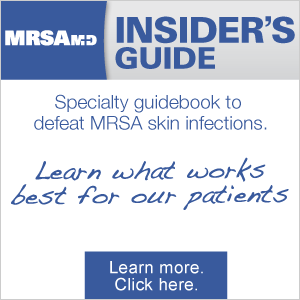Secondary Prevention: Preventing The Spread of MRSA
Overview
Secondary prevention is preventing the spread of MRSA infections (containment). Containment is challenging in the correctional setting.
- Note: coughing cannot spread MRSA except in the rare case of MRSA pneumonia.
MRSA skin infections pose the greatest risk for the spread of MRSA bacteria.
How To Prevent the Spread of MRSA
Cover all MRSA skin infections. MRSA skin infections pose the greatest risk for exposure to MRSA bacteria, because they are a large reservoir for MRSA bacteria.
- If the wound has significant drainage, the dressing may need to be changed throughout the day.
- If wound drainage cannot be controlled, the inmate needs to be isolated.
- Disposable gloves should be used with dressing changes.
- Wash hands after dressing changes. Hand washing removes MRSA bacteria off one’s hands before the bacteria can be transferred to other parts of the body where they can become colonized or infect broken skin.
- Wash towels after use.

